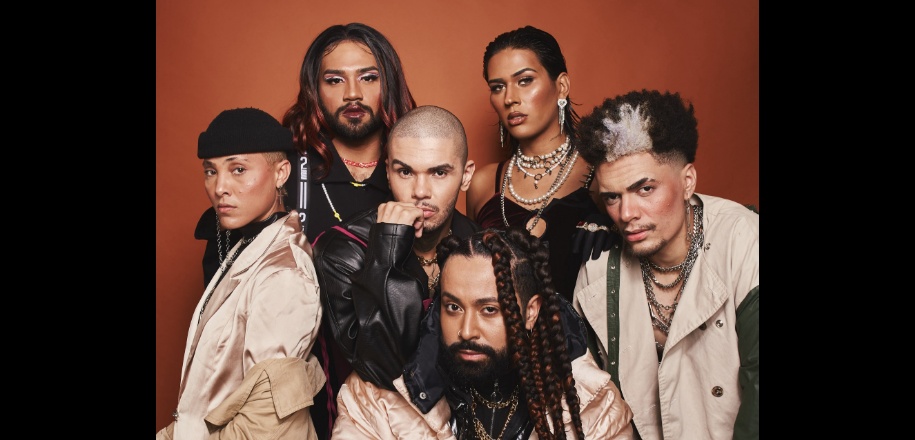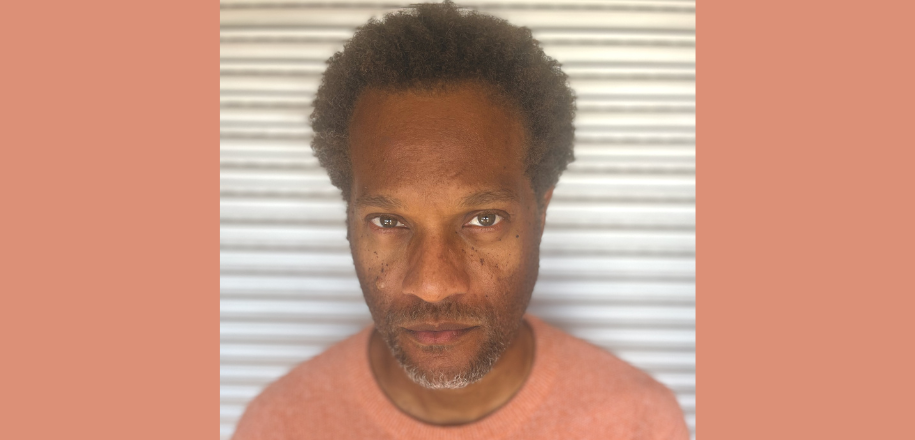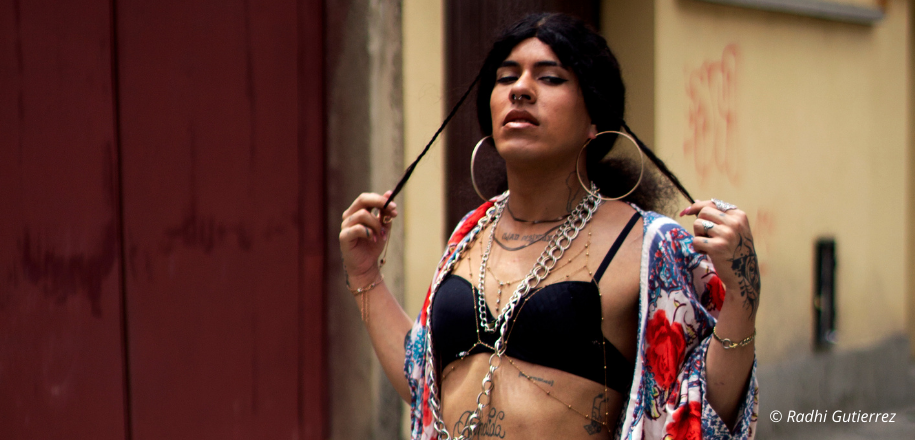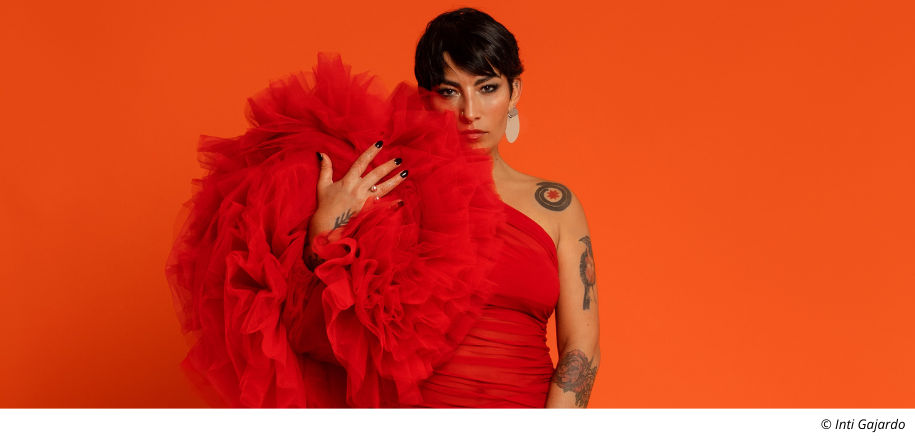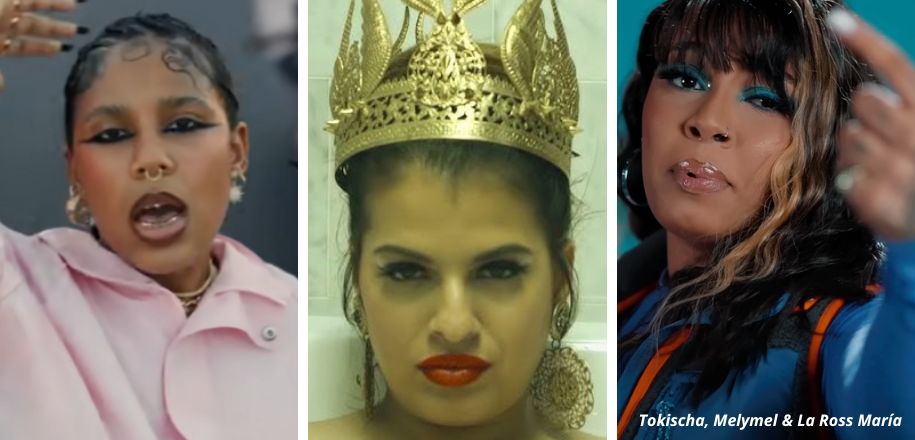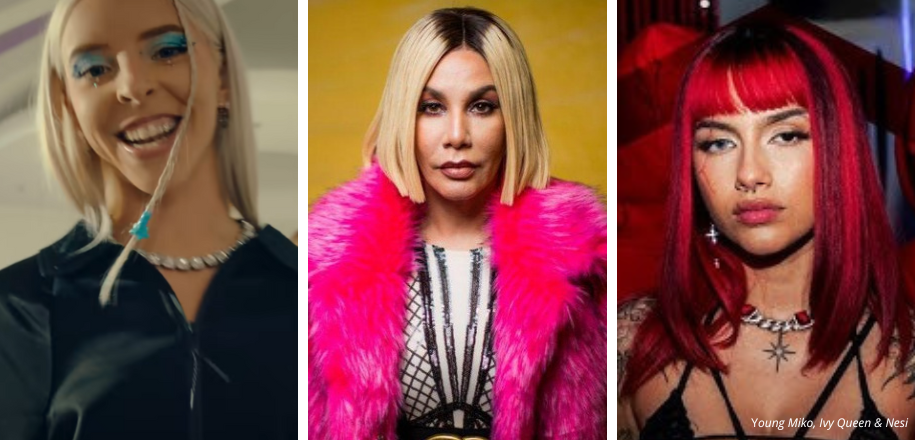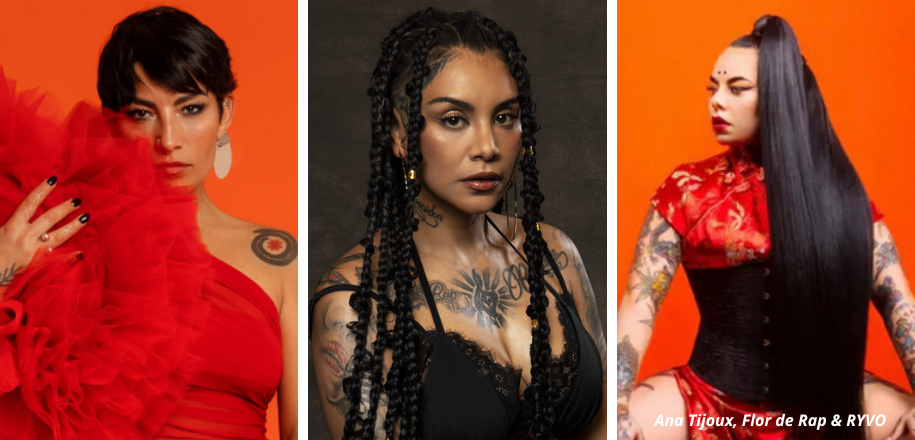Hailing from the periphery of São Paulo, Brazilian group Quebrada Queer was founded in June 2018. Between art and activism, lesbian rapper/beatmaker Apuke, trans woman rapper Boombeat, non-binary rapper Harlley and gay rappers Guigo, Murillo and Tchelo stand against LGBTQIAphobia, racism and social inequality. The 6 artists told us about their journey in hip hop, what it is like to be queer in Brazil and their projects.
HARLLEY: I actually believe it wasn’t me who was introduced to hip hop but hip hop that was introduced to me. As a kid, I was raised in the South area of the city of São Paulo, in a neighborhood called “Capão Redondo”, where the famous Racionais Mcs were from. They were already very successful before I was even born. I would always listen to a lot of Racionais, Trilha Sonora do Gueto, Sabotage, RZO and I was afraid of their songs.
As I grew up, I got to really understand the meaning of their lyrics and beat up my fear. A few years later, Black music was popular and I enjoyed Destiny’s Child, Usher and Nelly. That’s how I found out about my love for R&B.
GUIGO: In 2015.
BOOMBEAT: Back in 2010, with rap battles.
MURILLO: My first contact with hip hop was at in my late teens, when I went with my cousins to some rap battles. They used to battle and it was my first time into hip hop culture. From then on, something pushed me into writing and living it.
APUKE: By the age of 12, my parents split up and we left the church environment in which I grew up. From then on, my mon returned to her origins, musical tastes and behavior, bringing a lot of culture into our home.
TCHELO: I always listened to rap. I used to like Racionais, Criolo, Emicida, Karol Conká and Rico Dalasa, but I truly believe my introduction to it was with Quebrada Queer. I had already released a song called Me Empoderei, that is a kind of rap, but I didn’t feel like being part of it like I do now.
How did you start rapping?
HARLLEY: My first time in rap was as an active member of a regional collective in Capão Redondo. It helped me understand myself and awake the other side of me. I had always been too shy to sing, but this experience feeling safe and strong was magical. I’m thankful for everything I learned there.
BOOMBEAT: I started rapping when hanging out with my rapper friend Bivolt at rap battles and her shows. I got to know hip hop culture deeper and realized how my life was related to hip hop.
“Back in 2015, there was no real queer rap movement.” (Guigo)
MURILLO: I was going to rap battles with my cousins and listened a lot to Karol Conká, Rashid and Emicida. They were a big inspiration for me back then. But the one who really drove me to do this was Rico Dalasam. He talked on a TV show about being a rapper and gay.
Even all my other references didn’t have the same effect Rico did. Mainly because of my own doubts and fears about being gay and a rapper and all my insecurity caused by our homophobic society ant thoughts.
I believe that things are slowly getting better, mostly thanks to us who are now an inspiration for many more people. But basically, I released my very first single in 2015 and kept working after that.
APUKE: It was trough my older brother Thiago. He taught me a lot of Brazilian rap and introduced me to some major rappers back in the days, such as Racionais, Rzo and Facção Central among others.
TCHELO: I believe that rap begins when you’re on stage for the very first time. Rap is something you feel it in your life, isn’t it? But without a doubt, my professional initiation to rap was back in June 2018 with Quebrada Queer.
GUIGO: Back in 2015, there was no real queer rap movement. There were no parties or major festivals. That year, I released my first single and began to play it at small independent LGBTQI+ parties I went to. My work got recognized and from then on, other queer artists began to emerge.
Who were your role models while growing up?
HARLLEY: I always liked writing all the things I was feeling. I remember when I first talked about music and got my first beat, my main idea was to put my written poetry into the beat. I got it done and from then on, I tried new ways and formulas using poetry as a model. A while later, I figured out my musical attitude came from Rihanna, who was my main example. I hope she can listen to our work one day.
“Beyonce is a real living legend for me.” (Tchelo)
GUIGO: I’ve always had all the respect and support needed from my family, which is quite important when you’re LGBTQI+. This support helped soften the transitions and difficulties when I entered adulthood. I truly believe that these people and their care were very important in my own construction and development.
BOOMBEAT: Bivolt, Rico Dalasam and Karol Conká.
MURILLO: My mom has always been as inspiration for me and an example of strength and persistence. She is a single mom who raised 3 children.
In music, besides the one I already mentioned, there is Nicki Minaj that until today is a major source of inspiration. I think what she made is revolutionary and truly believe it has a major impact on many other LGBTQI+ lives.
APUKE: My mom and music (my best partner ever.)
TCHELO: I have many. But some artists inspired me in the beginning, and some are still and inspiration for me today. For instance, Emicida helped build a new rap scene in Brazil and gave society another understanding of rap culture and how to monetize with style.
Ellen Oléria, who is a singer but has some rhymes in some of her songs, inspired me a lot. She made me realize that I could be a singer and also a rapper.
Beyonce for sure is my major inspiration, even more when we talk about voice quality and strength, show-business, music evolution and making a revolution by being a Black girl. She’s a real living legend for me.
Why did you pick the name Quebrada Queer?
TCHELO: Actually, it was quite simple and fast and happened without any disagreements among us. When we first met and began to talk in a Whatsapp group, the name just came to us. We were all from peripherical hoods far away from the city center (also known as “Quebrada”) and all of us were kind of effeminate.
So we agreed that the term “Queer” suited us and would be good to define many gender identities. The name Quebrada Queer sounded really good. I suggested it and everyone liked it, so we’ve kept it till today.
“The standard model tries to rule LGBTQI+ bodies and looks at them through cis-gender and conservative eyes.” (Harlley)
What does the term “queer” mean to you?
HARLLEY: To me, “queer” means the destruction of an old-fashioned way of thinking that remains the standard model in our society. A model that still has oppressors, with way over problematic ideas, always trying to rule LGBTQI+ bodies and look at them through cis-gender and conservative eyes.
To be queer means to go against standards and explore even more the odd that may be creepy or classy. The important is not to be imitated by those who love to judge and oppress something that should be free.
Quebrada Queer debuted in June 2018 with the cypher “Quebrada Queer”. How did the Brazilian audience respond to it?
BOOMBEAT: As something completely new and innovative within the music industry. The audience loved it and received it in a very positive way. Obviously, there was a small group of people who didn’t like it and criticized it…
How do you usually write and compose as a group? (Do you do it separately or all together? Do you pick a beat first or start by writing?…)
APUKE: The whole process is cool. I usually start with the beat and create an instrumental. After that, we have writing sessions with the group. We use some main themes and methods to bring some issues into our texts and then, each of us begins to write its own part.
We write all together but also separately, depending on the moment. In this new QQ time, we’re looking to write and compose all together.
“Since our first release and until today, we have militated in a very clear way in our songs.” (Apuke)
Your songs address critical societal issues, such as LGBTQIAphobia, racism, and social inequality. Do you see yourselves as activists?
APUKE: Since our first release and until today, we have militated in a very clear way in our songs. It shows through all our songs. It is our daily life and experiences in society as LGBTQI+. We are confronted with these social issues every day. It is part of our own histories and as a “group”, we express it through our art.
If activism means to fight in a certain way for a common sense of justice and equality, then YES. After all, everything we put into our music is a way to support some ideology.
A part of your latest video “ABC do QQ” takes place in a classroom. Do you think rap can be an educational tool?
BOOMBEAT: Without a doubt, art itself has a powerful influence and gives strength to our feelings and thoughts regarding society. It brings internal changes that reverberate as one. I believe in art as an educational tool.
“As a trans woman, it is impossible to feel fully safe walking down the streets by myself.” (Boombeat)
You come from São Paulo. What is your relationship to this city?
BOOMBEAT: It is quite diverse and is different for everyone in the collective, depending on our life, skin color, social background, neighborhood, sexuality and gender.
São Paulo is an eclectic and non-stop city that has a little bit of everything for real. But, on the other hand, there are also huge discrepancies between millionaires and really poor and miserable people. You can notice it by simply walking in the city.
As a trans woman, it is impossible to feel fully relaxed and safe walking down the streets by myself.
“Homophobia comes a lot from ignorance, so our music aims to teach society through our experiences.” (Murillo)
MURILLO: Here in Brazil, even if we already have a big diversity of LGBTQI+ artists producing and releasing their work, we’re still far from what I consider FINE. But compared to how everything was when I first started, it has already evolved in some ways. It is because we work to become an influence and a reference for more and more people.
Making rap means to live and talk about our lives. And life experiences are easier to teach through music, for those who want to learn. Homophobia comes a lot from ignorance, so our music aims not only to oppress homophobic ideas, but also to teach society through our experiences and points of view.
What impact do Bolsonaro policies have on LGBTQIA artists in Brazil?
HARLLEY: Before anything, it is necessary to say that Bolsorano’s actions and politics affect not only LGTQI+ artists, but workers of different areas and conditions. From far, this has been our worst President ever, at least since I was born, and it has been very difficult to work and survive during the pandemic and this time of crisis.
It took too long to initiate Covid vaccination campaigns over here, and the whole sector of entertainment was unable to work.
Gladly, our situation nowadays is a little bit better, and we have more than half our population already vaccinated. Bolsonaro is a genocide, and we will always fight against it. 2022 is election year and we truly hope to set us free from him.
“All artists and workers have been affected in some way by the politics of our government.” (Guigo)
GUIGO: I believe his impact is not restricted to LGBTQIAP+ people. In these times of crisis, we should look at our country and all the difficulties we have in a responsible way. Our society is falling apart and all sectors are taking big risks. It is obvious that culture is going through a dark period, as well as our economy, education and mostly our health. People are dying for not having primal cares and enough room in hospitals.
It is really important to investigate all this mess and realize that our issues are way bigger than our bellies. Artistic class is in the middle of it of course, but we also should look at the whole picture. All artists and workers have been affected in some way by the actions and politics of our government.
What are your upcoming projects (despite the Covid pandemic)?
MURILLO: We want to work a lot. It has been a long time without any shows, and we were not able to meet and be together to compose and create. So now we want to enjoy the best we can. We are working on our first ideas for an album, and it has been an incredible experience, filled with learning. We always intend to learn a lot from one another, and it motivates us a lot.
Find Quebrada Queer on Facebook, Instagram, Twitter and YouTube.
© Lucas Silvestre

